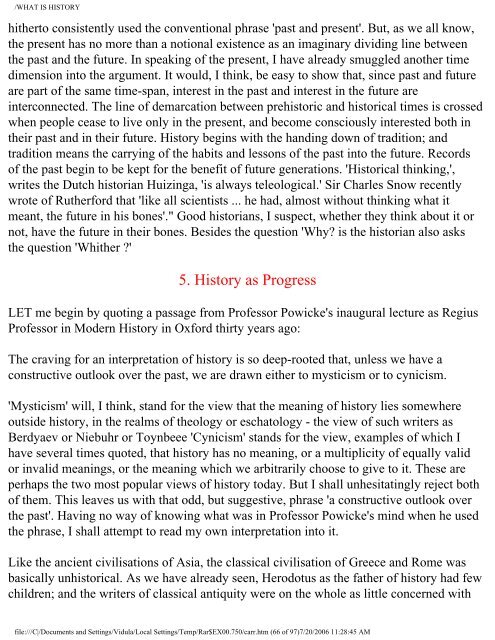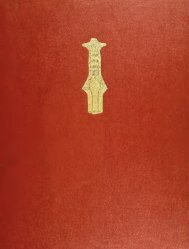What is History / by Edward Hallett Carr - Universal History Library
What is History / by Edward Hallett Carr - Universal History Library
What is History / by Edward Hallett Carr - Universal History Library
Create successful ePaper yourself
Turn your PDF publications into a flip-book with our unique Google optimized e-Paper software.
WHAT IS HISTORY<br />
hitherto cons<strong>is</strong>tently used the conventional phrase 'past and present'. But, as we all know,<br />
the present has no more than a notional ex<strong>is</strong>tence as an imaginary dividing line between<br />
the past and the future. In speaking of the present, I have already smuggled another time<br />
dimension into the argument. It would, I think, be easy to show that, since past and future<br />
are part of the same time-span, interest in the past and interest in the future are<br />
interconnected. The line of demarcation between preh<strong>is</strong>toric and h<strong>is</strong>torical times <strong>is</strong> crossed<br />
when people cease to live only in the present, and become consciously interested both in<br />
their past and in their future. H<strong>is</strong>tory begins with the handing down of tradition; and<br />
tradition means the carrying of the habits and lessons of the past into the future. Records<br />
of the past begin to be kept for the benefit of future generations. 'H<strong>is</strong>torical thinking,',<br />
writes the Dutch h<strong>is</strong>torian Huizinga, '<strong>is</strong> always teleological.' Sir Charles Snow recently<br />
wrote of Rutherford that 'like all scient<strong>is</strong>ts ... he had, almost without thinking what it<br />
meant, the future in h<strong>is</strong> bones'." Good h<strong>is</strong>torians, I suspect, whether they think about it or<br />
not, have the future in their bones. Besides the question 'Why? <strong>is</strong> the h<strong>is</strong>torian also asks<br />
the question 'Whither ?'<br />
5. H<strong>is</strong>tory as Progress<br />
LET me begin <strong>by</strong> quoting a passage from Professor Powicke's inaugural lecture as Regius<br />
Professor in Modern H<strong>is</strong>tory in Oxford thirty years ago:<br />
The craving for an interpretation of h<strong>is</strong>tory <strong>is</strong> so deep-rooted that, unless we have a<br />
constructive outlook over the past, we are drawn either to mystic<strong>is</strong>m or to cynic<strong>is</strong>m.<br />
'Mystic<strong>is</strong>m' will, I think, stand for the view that the meaning of h<strong>is</strong>tory lies somewhere<br />
outside h<strong>is</strong>tory, in the realms of theology or eschatology - the view of such writers as<br />
Berdyaev or Niebuhr or Toynbeee 'Cynic<strong>is</strong>m' stands for the view, examples of which I<br />
have several times quoted, that h<strong>is</strong>tory has no meaning, or a multiplicity of equally valid<br />
or invalid meanings, or the meaning which we arbitrarily choose to give to it. These are<br />
perhaps the two most popular views of h<strong>is</strong>tory today. But I shall unhesitatingly reject both<br />
of them. Th<strong>is</strong> leaves us with that odd, but suggestive, phrase 'a constructive outlook over<br />
the past'. Having no way of knowing what was in Professor Powicke's mind when he used<br />
the phrase, I shall attempt to read my own interpretation into it.<br />
Like the ancient civil<strong>is</strong>ations of Asia, the classical civil<strong>is</strong>ation of Greece and Rome was<br />
basically unh<strong>is</strong>torical. As we have already seen, Herodotus as the father of h<strong>is</strong>tory had few<br />
children; and the writers of classical antiquity were on the whole as little concerned with<br />
file:///C|/Documents and Settings/Vidula/Local Settings/Temp/Rar$EX00.750/carr.htm (66 of 97)7/20/2006 11:28:45 AM







